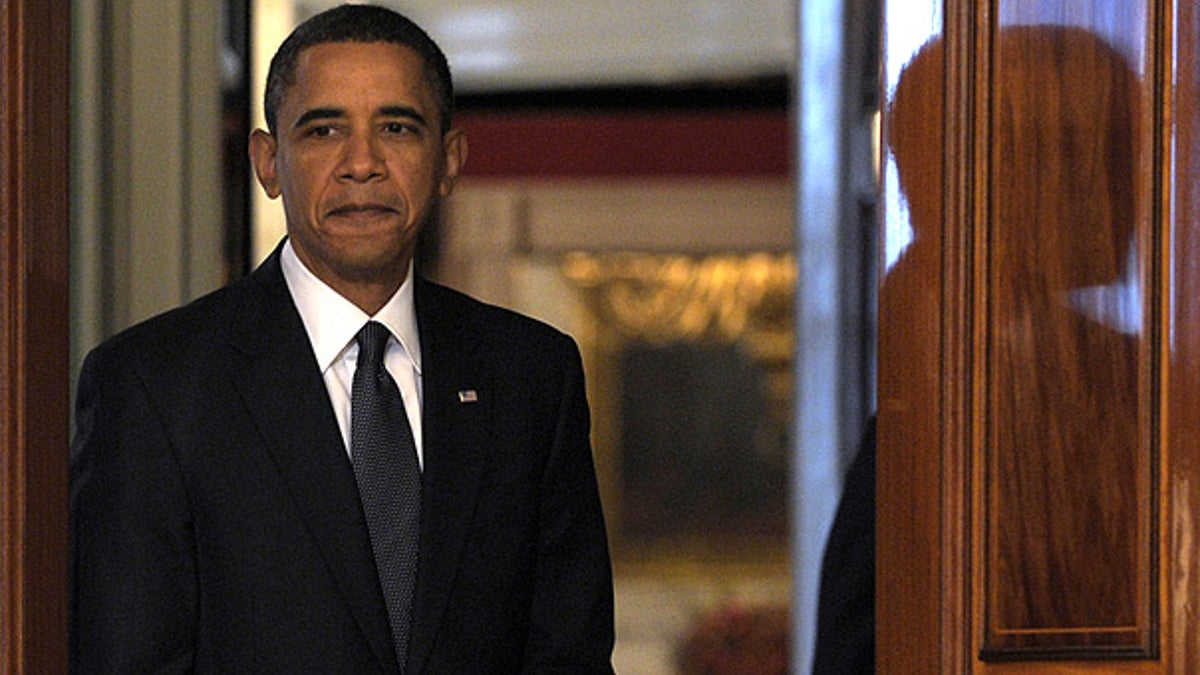
Jan. 20: President Obama waits to speak in the East Room of the White House. (AP)
President Obama called on Congress Thursday to expand the government's ability to limit the size and complexity of major financial institutions, turning to an issue he hopes can gain bipartisan support after his party's stunning loss in the Massachusetts Senate race gave Democrats second thoughts about their domestic agenda.
The president cast his proposals as a way to prevent banks from becoming too bloated and taking on risks that ultimately may threaten the economy. The president, complaining about "obscene bonuses" on Wall Street, accused the firms of returning to irresponsible behavior and said regulation is necessary.
"We have to enact common-sense reforms that will protect the American taxpayer and the American economy from future crises," Obama said. "Never again will the American taxpayer be held hostage by a bank that is too big to fail. ... We simply cannot return to business as usual."
The president proposed restrictions to strengthen measures already approved in a financial reform bill by the House of Representatives. The Senate is drafting its version of the bill.
One administration official said the president began discussing such restrictions with his economic team a couple months ago to "cut down on excessive risk-taking."
Obama is placing a new emphasis on Wall Street regulations, with a goal of limiting the financial sector to smaller, less interconnected firms. The complexity of the financial industry forced the government in 2008 to approve massive bailouts to prevent a systemwide economic collapse.
The proposal would seek to limit bank consolidation and ensure that banks, and financial institutions that contain banks, cannot invest in hedge funds or other funds "unrelated to serving customers" for profit.
In making the announcement, the president was flanked by former Federal Reserve Chairman Paul Volcker and William Donaldson, who was appointed by President George W. Bush as head of the Securities and Exchange Commission. Both men have advocated tighter banking restrictions. Volcker heads the President's Economic Recovery Advisory Board.
Obama last year proposed a series of measures to tighten the reins on financial institutions in hopes of preventing a recurrence of the crisis that struck the country's financial system in the fall of 2008.
His announcement Thursday broadens those measures, particularly by endorsing Volcker's proposal to restrict proprietary trading by commercial banks. Such a limit would separate commercial banks from investment banks, a line that was blurred a decade ago by the repeal of the Depression-era Glass-Steagall Act. That act originally separated commercial and investment banking.
News of the announcement came after Treasury Secretary Timothy Geithner had a private dinner Wednesday night with chief executives from some of the top Wall Street banks.
It also came as banking regulation appeared to be the only plank in Obama's agenda able to survive a stunning Republican Senate victory in Massachusetts on Tuesday that significantly strengthened the GOP's bargaining hand.
The victory has Democrats rethinking their approach to health care reform, which appeared to be in its final stages before Tuesday's election.
But financial regulations could survive.
"I don't want to see us have to go through what we've been through here where we've been relying on one party to get something," Senate Banking Committee Chairman Christopher Dodd, D-Conn., said Wednesday.
Moreover, Geithner met with Republican Senate leader Mitch McConnell of Kentucky on Tuesday. Administration officials now believe that while Republicans may seek to block other aspects of the president's agenda, McConnell is considering making financial regulation an exception.
To that end, Dodd has been negotiating with the Banking Committee's top Republican, Sen. Richard Shelby of Alabama.
"We're talking, and obviously my hope is that in the next few weeks we'll ... move forward," Dodd said.
Senate Democratic and Republican aides have been discussing consumer alternatives, including one that would create a new division within an overarching banking regulator. The entity would have its own budget and would have the power to write new consumer regulations. Enforcement would be left to bank regulators.
White House officials would not say whether such a compromise would be acceptable. And congressional officials cautioned that the plan was still in flux and could change.
The Associated Press contributed to this report.












































